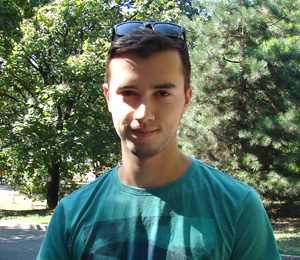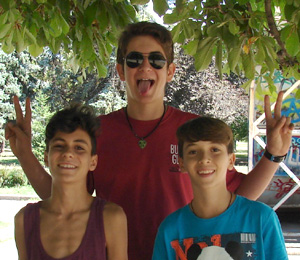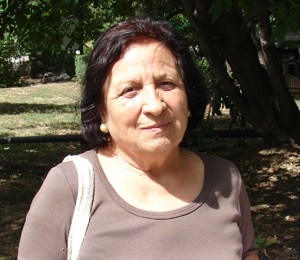Today, on September 6, 131 years after the Unification of Eastern Rumelia with the Principality of Bulgaria, walking the city streets I keep asking: what is it that unites Bulgarians today?
In Boris Garden downtown Sofia I meet Christina who is in a hurry. Here's what she said:
"People are divided. Bulgarians tend to be a bit stubborn and independent. This is the way we are used to for surviving and it is difficult for us to unite. We are individualists. This is a big advantage sometimes, but it also prevents us from achieving unity. It's all about the attitude of the individual. We can choose to be more open-minded people or just do nothing about it."
Next I see a young gentleman sitting on a park bench. His name is Kanchev and he is 39 years old. He is reading the morning press and enjoying the nice weather. How does he feel?
"I feel unity, as we are all part of the European Union. Basically, everything is relative and everyone has their own opinion. But what is good about democracy is pluralism and the fact that anyone can have their belief about life. I do not think this can divide us. Individual thinking and having your own opinion is a prerequisite for finding similarities and proximity. The fear of migrants that hovers in society is an additional motive for more unity."
 I am thinking about attitude and how freedom of opinion could bring me closer to my countrymen. A dog looks at me in the eyes, as if waiting to give him an answer. I look up and see a young man. His name is Kalin and he is walking in the park with a dreamy look in his eyes. I ask him what is it that unites us Bulgarians?
I am thinking about attitude and how freedom of opinion could bring me closer to my countrymen. A dog looks at me in the eyes, as if waiting to give him an answer. I look up and see a young man. His name is Kalin and he is walking in the park with a dreamy look in his eyes. I ask him what is it that unites us Bulgarians?
"We are united by our nationality, values, art and traditions. Other things separate us. I think statesmen do not govern properly and hence the fear in people. Of course, partially we are also to blame for this because we choose these people, but I believe that things will get better. Bulgarians should be more interested in the type of people who govern us."
 I reach the National Palace of Culture. Behind the monument "1300 years Bulgaria" I see teenagers relaxing in the heat, sitting on their skateboards. They speak passionately about some topic but I manage to ask them my questions.
I reach the National Palace of Culture. Behind the monument "1300 years Bulgaria" I see teenagers relaxing in the heat, sitting on their skateboards. They speak passionately about some topic but I manage to ask them my questions.
"Love! But actually Bulgarians are not very united. If we had a common cause, we could stand united, but nowadays everyone thinks only about themselves and people are selfish. Everything is money and work. Fathers do not know their children because they work all day long and cannot see their family. I am sure it is not just me who thinks this way. The news shows people leaving the country. This is because they do not like the way the live here and they cannot cope with the situation. Half of the people who want to engage in honest business just cannot do it because of the obstacles. Our country is beautiful – we have sea and mountains, but no proper governing. I love Bulgaria", Deyan says with flame in his eyes.
 At the end of my walk I see an old lady coming from the nearby market. Her name is Ilka Gateva. She is 78 years old and is a former teacher:
At the end of my walk I see an old lady coming from the nearby market. Her name is Ilka Gateva. She is 78 years old and is a former teacher:
"Unfortunately there is division between Bulgarians. What is the reason? Perhaps money is the reason. All seek personal gains and national interests remain in the background. I am a teacher and we used to teach children patriotism. I taught literature. The Bulgarian National Revival is the most romantic part of our history. I have always tried to teach children to love Bulgaria. These days nobody talks about love of the country. Politicians are not worried about the fact that young people are leaving the country and this is very dangerous. I think if conditions are created for them to return, there will be radical changes as they would bring back the mentality and attitude we have lost."
English: Alexander Markov
A Christmas tree with Bulgarian decorations has been placed in a central location at the Griffin Museum of Science and Industry in Chicago. For the fifth consecutive year, Bulgarians living in Chicago crafted the lavish decoration of the Bulgarian..
The usurpation of cultural heritage is one of the many inevitable consequences of any military conflict, both historically and today. Until the end of the war in Ukraine, it is impossible to adequately analyse the extent of the damage caused to the..
Athens plans to modernise the Greek army by 2030 Greece's Defence Minister Nikos Dendias presented the plan for changes in the army to the parties in parliament. The reforms will cover all three branches of the military. By 2030, 33 units..
Modernizing critical thinking skills, fact-checking skills and media literacy are essential for society, especially for young people in Bulgaria - the..

+359 2 9336 661
